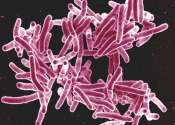Squamous cell carcinoma study: Cancer stem cells are fueled through dialogue with their environments
What drives tumor growth? Is it a few rogue cells imposing their will upon healthy tissue, or diseased tissue bringing out the worst in otherwise peaceable cells? Or is it a back-and-forth, a dialogue between the two? According ...
Nov 30, 2022
0
648









